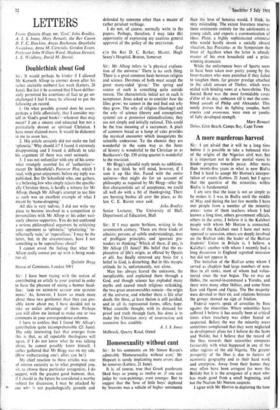Sir : Mr Allsop refers to 'a physical explana- tion
of the universe.' There is no such thing. There is a great common basis between religion and science. Devotees of both must accept the great many-sided 'given.' The spring and source of each is something quite outside reason. The characteristic initial act in each is acceptance. Jesus asked us to consider how the lilies grow; we cannot in the end find out why they grow. The why of religion (theology) and the why of science (theory and conceptional system) are a posteriori rationalisations; they are not simply and initially rational. This could be the true meaning of a sacrament. A piece of common bread or a lump of cake provides the mystical encounter which inaugurates the scientific endeavour. To the chemist they are wonderful in the same way as the Jesus of history is wonderful to the Christian or as Beethoven's Op. 130 string quartet is wonderful to the musician.
Mr Hogg's splendid reply needs no additions. I do not think he will mind, however, if I sum it up like this. Faced with the entire universe—that might do for an account of philosophy as required by Mr Hogg—after the first characteristic act of acceptance, we could all well do with a bit of thanksgiving. There are burning bushes all over the place, as the late C. E. Raven once said.
John Bradley Senior Lecturer, The University of Hull, Department of Education, Hull










































 Previous page
Previous page